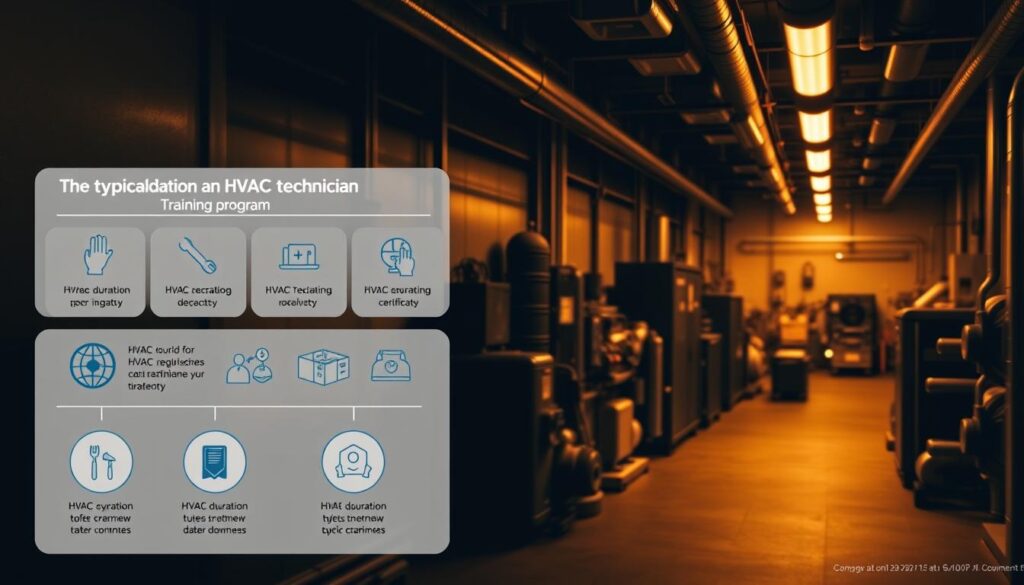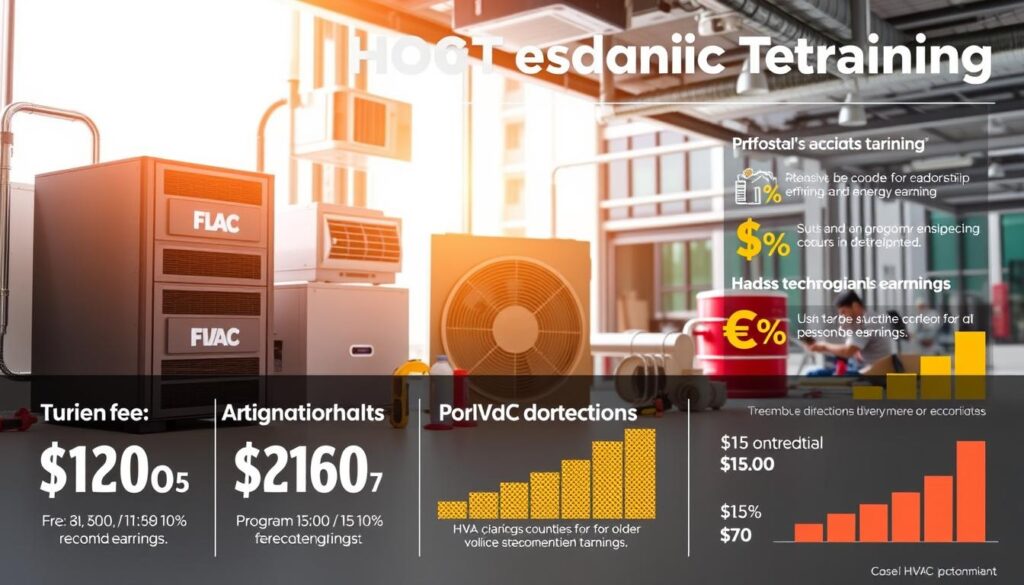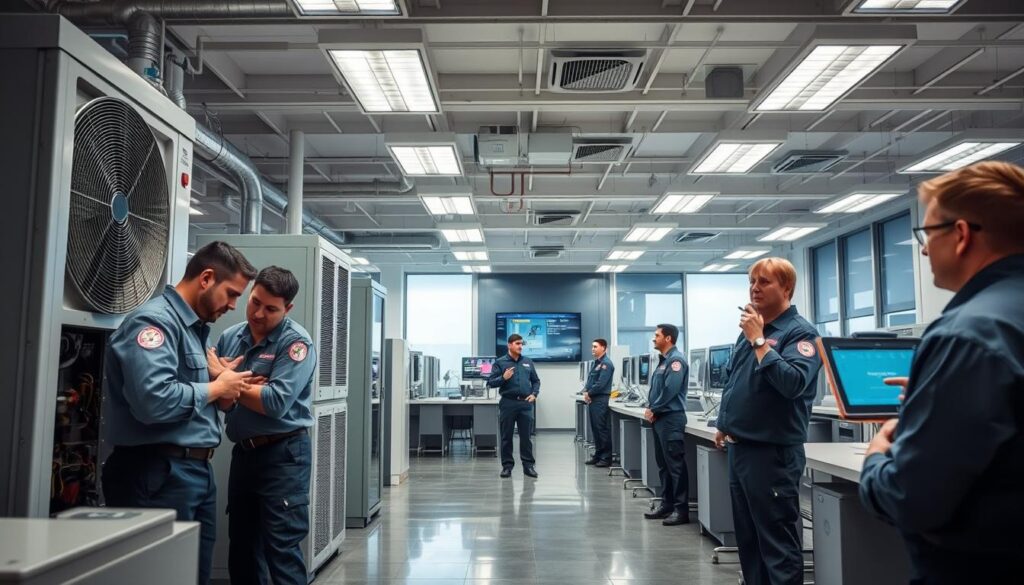Affiliate Disclosure
HVAC Guide Guys is a participant in the Amazon Services LLC Associates Program, an affiliate advertising program designed to provide a means for sites to earn advertising fees by advertising and linking to Amazon.
How Long Does It Take to Become an HVAC Tech?? Are you curious about how fast you can switch to a rewarding HVAC career? Becoming an HVAC technician is both flexible and exciting.

How Long Does It Take to Become an HVAC Tech?The time it takes to learn HVAC varies a lot. You can start with quick certificate programs in 6 months or go for longer apprenticeships up to 5 years. This lets you choose what fits your learning style and career dreams.
The US Bureau of Labor Statistics says the HVAC field will grow 5% from 2021 to 2031. This means lots of chances for new technicians. Knowing how long it takes to become an HVAC tech is key for planning your career.
Key Takeaways
- HVAC training can range from 6 months to 5 years
- Multiple educational paths are available for aspiring technicians
- Certification is essential for career advancement
- Job market for HVAC professionals continues to grow
- Training options include certificates, degrees, and apprenticeships
Table of Contents
Understanding the HVAC Career Path
The HVAC technician career path is exciting for those who love technical work. HVAC technicians are key to keeping places comfortable and safe. They work in homes, offices, and factories.
What is an HVAC Technician?
An HVAC technician installs, fixes, and keeps heating, cooling, and refrigeration systems running. Training can take 1 to 2 years. They need to know a lot about mechanical systems and how to solve problems.
Career Growth and Opportunities
The HVAC career path has many ways to move up:
- Entry-level technician positions
- Specialized system installation
- Commercial and industrial system maintenance
- Independent contracting
- Management and supervisory roles
“The HVAC industry provides continuous learning and growth opportunities for skilled professionals.” – Industry Expert
Industry Demand and Job Outlook
HVAC technicians are in high demand, with good job prospects everywhere. They make about $57,300 a year on average. Jobs are expected to grow by 9% from 2023 to 2033.
Several things are making the industry grow:
- More building projects
- New tech in cooling systems
- More focus on saving energy
- Old HVAC systems need to be replaced
Choosing an HVAC technician career can be very rewarding. It offers steady work, good pay, and chances to keep learning and growing.
Explore Our HVAC Shop
Looking for top-rated HVAC tools, parts, and accessories? Visit our shop and find the perfect solution for your needs.
Visit the ShopHow Long Does It Take to Become an HVAC Tech?
Starting your HVAC career needs careful planning and knowing the training timeline. The time it takes to become an HVAC tech varies a lot. Most people can finish their training in 6 months to 3 years.
There are different ways to start your HVAC career. Here are the main training options:
- Certificate Programs: Typically 6-12 months
- Quick entry into the workforce
- Focused technical training
- Associate Degree Programs: Approximately 2 years
- Comprehensive technical education
- More in-depth theoretical knowledge
- Apprenticeship Programs: 3-5 years
- Combines classroom learning with hands-on experience
- Earn while you learn
The job growth for HVAC technicians is 5%, which is average. Your training time depends on your program, how hard you work, and how fast you learn.
Investing time in quality HVAC training ensures a solid foundation for a successful technical career.
Getting extra certifications like EPA 608 and NATE can take 1-2 weeks to 6 months. These certifications make you more skilled and attractive in the HVAC field.
Explore Our HVAC Shop
Looking for top-rated HVAC tools, parts, and accessories? Visit our shop and find the perfect solution for your needs.
Visit the ShopTypes of HVAC Training Programs
Choosing the right hvac training courses is key to your HVAC career. You have many educational options. Each one fits different learning styles and career goals.
When looking at hvac trade school programs, you’ll find three main paths:
Certificate Programs: Quick Entry into the Field
Certificate programs are a quick way to start in HVAC. They last 6-12 months and teach the basics for entry-level jobs.
- Duration: 9 months on average
- Focuses on practical, hands-on skills
- Ideal for rapid career transition
Associate Degree Programs: More in-Depth Education
An associate degree takes about two years. It gives a deep dive into HVAC systems and tech.
- Includes advanced technical coursework
- Provides broader career opportunities
- Often includes general education requirements
Apprenticeship Programs: Earn While You Learn
Apprenticeships last 3-5 years. They mix classroom learning with real-world, paid training.
| Program Type | Duration | Key Benefits |
|---|---|---|
| Certificate | 6-12 months | Quick entry, focused skills |
| Associate Degree | 2 years | Comprehensive education |
| Apprenticeship | 3-5 years | Paid training, extensive experience |
Your choice depends on your goals, time, and career dreams. Each path has its own benefits for a successful HVAC career.
Essential HVAC Certifications and Licensing Requirements
Understanding the hvac certification timeline is key to success in the HVAC field. Professional certifications show your skills and dedication to quality work.
The EPA Section 608 Certification is a must for HVAC technicians. It lets you work with refrigerants legally. There are four EPA certifications:
- Type I: Small appliances
- Type II: High-pressure appliances
- Type III: Low-pressure appliances
- Universal: All equipment types
NATE (North American Technician Excellence) Certification is the top choice for HVAC licensing. It proves your technical skills and knowledge in HVAC specialties.
| Certification | Key Requirements | Exam Cost |
|---|---|---|
| EPA Section 608 | Federal refrigerant handling permit | $20-$150 |
| NATE Certification | Technical competency validation | $50-$250 |
| State Licensing | Varies by state requirements | $50-$300 |
Pro tip: Some states have specific licensing requirements beyond federal certifications. Always check your local regulations to ensure full compliance.
Most states need 12 months of experience for professional certifications. An HVAC apprenticeship can give you the needed experience and training.
Explore Our HVAC Shop
Looking for top-rated HVAC tools, parts, and accessories? Visit our shop and find the perfect solution for your needs.
Visit the ShopSkills and Education Prerequisites for HVAC Training
Starting an HVAC career needs careful planning and skill building. You’ll need a mix of book smarts, technical skills, and physical strength.
Before starting HVAC training, you must know the skills needed for success. HVAC job prep involves learning many skills to stand out in the field.
Academic Requirements
For an HVAC career, you’ll need:
- High school diploma or equivalent
- Strong math skills
- Basic physics and chemistry knowledge
- Algebra and geometry skills
Technical Skills Needed
HVAC technicians need to master several key skills:
- Understanding electrical systems
- Knowing the refrigeration cycle
- Reading blueprints
- Proficiency in CAD software
- Troubleshooting complex systems
Physical Requirements
The HVAC job requires a lot of physical ability:
- Physical strength for lifting heavy equipment
- Good hand-eye coordination
- Ability to work in tight spaces
- Comfort in different temperatures
Committing to these skills is key to a successful HVAC career.
Cost and Investment in HVAC Education

Starting an HVAC career means a big financial step. The cost of HVAC programs varies a lot. You can choose from affordable certificates to more detailed associate degrees. Knowing these costs helps you plan your education better.
When looking at HVAC training time, you’ll see many options with different prices:
- Certificate Programs: $1,200 – $15,000
(Typically 6-12 months) - Associate Degree Programs: $15,000 – $35,000
(18-24 months of study) - Apprenticeship Programs: $500 – $2,000
(3-5 years of combined training)
Costs aren’t just about tuition. You’ll also need money for:
- Books and supplies: $500 – $1,000 annually
- Tools and uniforms: $600 – $800
- EPA certification examination: $40 – $240
- Initial licensing fees: $100 – $300
Many students use financial aid to help pay for school. Scholarships, grants, and loans can lower what you have to pay. Some HVAC companies even help with tuition for their employees.
Investing in HVAC education can lead to a stable career with a median annual salary of $50,590 and projected job growth of 5% over the next decade.
Your HVAC training investment can pay off big time. It can lead to career growth and good pay in a growing field.
Explore Our HVAC Shop
Looking for top-rated HVAC tools, parts, and accessories? Visit our shop and find the perfect solution for your needs.
Visit the ShopCareer Advancement Opportunities in HVAC
Your HVAC technician career path offers exciting opportunities for growth and specialization. As you gain experience, multiple avenues open up to advance your professional trajectory and increase your earning.
The time you invest in HVAC job preparation can lead to significant career progression. Experienced technicians can explore various specialized roles that enhance both skills and income.
Specialization Options
HVAC professionals can develop expertise in unique areas such as:
- Energy auditing
- Smart system integration
- Refrigeration technology
- Indoor air quality inspection
- Industrial climate control systems
Salary Progression
Your earning grows substantially with experience. Entry-level technicians start around $22.47 per hour. Experienced professionals can earn up to $32.83 per hour.
| Experience Level | Average Hourly Wage |
|---|---|
| Entry-Level (0-1 year) | $22.47 |
| Mid-Level (3-6 years) | $27.65 |
| Senior-Level (7+ years) | $32.83 |
Management Positions
With dedication and continuous learning, you can advance to leadership roles like service manager or operations manager. Senior HVAC management positions can command salaries up to $125,000 annually.
Strategic certifications and ongoing professional development are key to unlocking these advanced career opportunities in the dynamic HVAC industry.
Explore Our HVAC Shop
Looking for top-rated HVAC tools, parts, and accessories? Visit our shop and find the perfect solution for your needs.
Visit the ShopModern HVAC Technology and Training Requirements

The HVAC industry is changing fast with new technologies. These changes are making hvac training courses and certification timelines different. Today’s HVAC pros need to keep up with digital innovation and smart systems.
Important tech advancements are changing how HVAC techs work:
- AI-driven diagnostic systems
- Internet of Things (IoT) enabled equipment
- Smart home and commercial building automation
- Remote system monitoring technologies
Your hvac certification timeline now needs more than just mechanical skills. Modern training focuses on:
- Advanced computer literacy
- Data analysis capabilities
- Understanding complex digital control systems
- Environmental sustainability practices
Technical schools are updating their curriculum to prepare students for these advanced technologies. Prospective HVAC techs must learn strong digital skills along with mechanical ones.
New technologies mean you’ll need to keep learning and adapting. Your success in HVAC will depend on using new tech and solving problems effectively.
Choosing the Right HVAC Training Program
Finding the best HVAC trade school program takes research and planning. Your education will shape your future career. Look for programs that cover both theory and practical skills in HVAC.
When looking at HVAC apprenticeship length and training, choose accredited schools. The US Department of Education, NCCER, and NATE are key. Also, find programs with flexible schedules to fit your life and work.
Hybrid training programs mix online learning with lab work. They offer flexibility and hands-on skills. Look for schools with strong career services and industry connections for job help and networking.
Your goal is to get ready for certification and real-world challenges. Check the program’s curriculum, instructor experience, and hands-on training. With the HVAC industry growing 4% by 2029, the right education will lead to a fulfilling career.
FAQ
How long does it typically take to become a certified HVAC technician?
What certifications are required to work as an HVAC technician?
What are the educational requirements to become an HVAC technician?
How much does HVAC training typically cost?
How long does it typically take to become a certified HVAC technician?
What certifications are required to work as an HVAC technician?
What are the educational requirements to become an HVAC technician?
How much does HVAC training typically cost?
FAQ
How long does it typically take to become a certified HVAC technician?
The time it takes to become an HVAC technician varies. Certificate programs last 6-12 months. Associate degree programs take about 2 years. Apprenticeships can last 3-5 years.
Your specific timeline depends on the training type, your experience, and how fast you learn.
What certifications are required to work as an HVAC technician?
You need the EPA Section 608 certification for refrigerants. NATE certification is also recommended. Some states require specific HVAC licenses, so check local laws.
What are the educational requirements to become an HVAC technician?
You need a high school diploma or equivalent. You’ll need vocational training or an apprenticeship. These programs offer classroom and hands-on training.
Good math skills, mechanical aptitude, and problem-solving are key for success.
How much does HVAC training typically cost?
Training costs vary from
FAQ
How long does it typically take to become a certified HVAC technician?
The time it takes to become an HVAC technician varies. Certificate programs last 6-12 months. Associate degree programs take about 2 years. Apprenticeships can last 3-5 years.
Your specific timeline depends on the training type, your experience, and how fast you learn.
What certifications are required to work as an HVAC technician?
You need the EPA Section 608 certification for refrigerants. NATE certification is also recommended. Some states require specific HVAC licenses, so check local laws.
What are the educational requirements to become an HVAC technician?
You need a high school diploma or equivalent. You’ll need vocational training or an apprenticeship. These programs offer classroom and hands-on training.
Good math skills, mechanical aptitude, and problem-solving are key for success.
How much does HVAC training typically cost?
Training costs vary from $1,200 for short programs to $30,000 for associate degrees. Many students get financial aid, scholarships, or employer help. The investment is worth it, given the strong job market and salaries.
What are the career advancement opportunities for HVAC technicians?
HVAC technicians can specialize in areas like commercial refrigeration or solar installation. They can move into supervisory roles, start their own business, or become specialized contractors. Continuous learning and certifications help advance your career.
What physical requirements are needed for an HVAC technician?
HVAC technicians need to be physically fit. They must lift heavy equipment, work in tight spaces, climb ladders, and stand for long periods. Good hand-eye coordination, stamina, and ability to work in various weather are essential.
How is technology changing HVAC training?
HVAC training now includes smart systems, IoT, and AI diagnostics. Technicians learn about digital controls, energy management, and advanced troubleshooting. They use sophisticated tools and software.
What should I look for in an HVAC training program?
Look for accredited programs with hands-on training and experienced instructors. Check the program length, job placement rates, and apprenticeship opportunities. Also, consider local licensing requirements, scheduling flexibility, and financial aid options.
,200 for short programs to ,000 for associate degrees. Many students get financial aid, scholarships, or employer help. The investment is worth it, given the strong job market and salaries.
What are the career advancement opportunities for HVAC technicians?
HVAC technicians can specialize in areas like commercial refrigeration or solar installation. They can move into supervisory roles, start their own business, or become specialized contractors. Continuous learning and certifications help advance your career.
What physical requirements are needed for an HVAC technician?
HVAC technicians need to be physically fit. They must lift heavy equipment, work in tight spaces, climb ladders, and stand for long periods. Good hand-eye coordination, stamina, and ability to work in various weather are essential.
How is technology changing HVAC training?
HVAC training now includes smart systems, IoT, and AI diagnostics. Technicians learn about digital controls, energy management, and advanced troubleshooting. They use sophisticated tools and software.
What should I look for in an HVAC training program?
Look for accredited programs with hands-on training and experienced instructors. Check the program length, job placement rates, and apprenticeship opportunities. Also, consider local licensing requirements, scheduling flexibility, and financial aid options.

